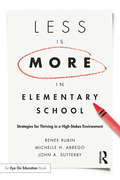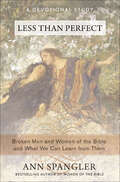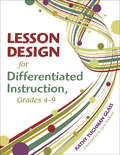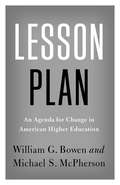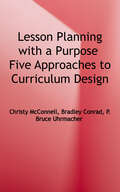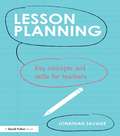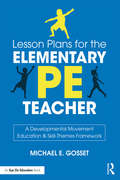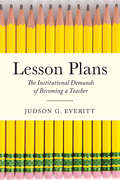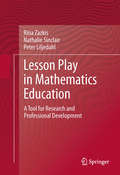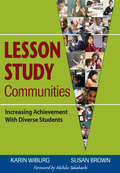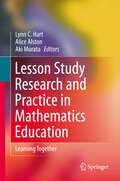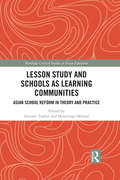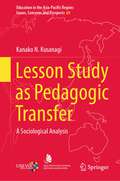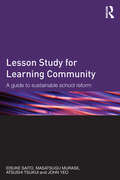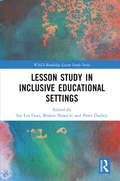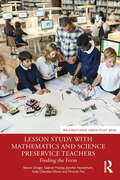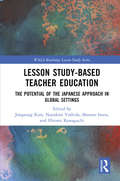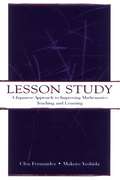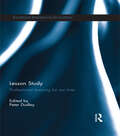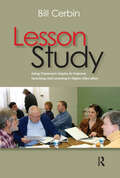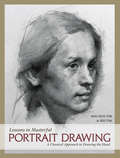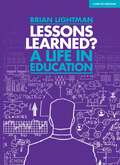- Table View
- List View
Less Is More in Elementary School: Strategies for Thriving in a High-Stakes Environment
by John Sutterby Renee Rubin Michelle AbregoIn this era of rigorous standards, testing, and overcrowded curricula, many teachers are left wondering how they’re ever going to cover the material. Less Is More in Elementary School offers realistic solutions by providing ways teachers can streamline their curriculum, get the most out of assessment, communicate with families, and engage students in their own learning. This much-needed book will help you meet the demands of the Common Core more efficiently and effectively. You’ll learn how to… integrate the curriculum so that you can take time to slow down and explore topics in depth; help students become critical readers, problem solvers, collaborators, and communicators; make students more engaged, reflective, and self-regulating; get the most out of assessment during this era of high-stakes testing; maintain high expectations for all students but modify instruction to ensure all students progress; communicate more effectively with families to build trust during a time of change and high-stakes assessments; and overcome obstacles, such as the emphasis on testing, the need for more technology, and finding teacher collaboration time. Each chapter is filled with practical strategies that you can implement immediately, as well as suggested resources for learning more about a particular topic.
Less Than Perfect: Broken Men and Women of the Bible and What We Can Learn from Them
by Ann SpanglerWhat can the Bible&’s most flawed men and women reveal about who God is and how he reaches out to less-than-perfect people? In Less Than Perfect, bestselling author Ann Spangler takes us beyond cardboard cutouts of 38 biblical characters to show us how these were real individuals who had dreams, temptations, and weaknesses just like us.Whether considering the murderous Herodias, the scheming Jacob, or the doubting Sarah, Spangler approaches both familiar and lesser known characters with fresh eyes. We meet each of these individuals again as if for the first time as Spangler offers a dramatic retelling of their lives, insight into the historical and cultural context of their time, and key takeaway points for our lives today. Each chapter includes questions for discussion or reflection, making Less Than Perfect ideal for individual or group Bible study.Entertaining, informative, and inspirational, Less Than Perfect gives you a big picture view of the Bible even as it takes you into the hearts and minds of people with struggles just like yours. As you learn more about the individuals who are part of your spiritual family tree, you&’ll discover why God loves to use imperfect people to tell his perfect story of redemption.
Lesson Design for Differentiated Instruction, Grades 4-9
by Kathy Tuchman GlassThis user-friendly resource provides step-by-step guidance and a detailed template for creating meaningful lessons that are differentiated according to students' learning characteristics.
Lesson Plan: An Agenda for Change in American Higher Education
by William G. Bowen Michael S. McphersonAmerican higher education faces some serious problems—but they are not the ones most people think. In this brief and accessible book, two leading experts show that many so-called crises—from the idea that typical students are drowning in debt to the belief that tuition increases are being driven by administrative bloat—are exaggerated or simply false. At the same time, many real problems—from the high dropout rate to inefficient faculty staffing—have received far too little attention. In response, William G. Bowen and Michael S. McPherson provide a frank assessment of the biggest challenges confronting higher education and propose a bold agenda for reengineering essential elements of the system to meet them. The result promises to help shape the debate about higher education for years to come. Lesson Plan shows that, for all of its accomplishments, higher education today is falling short when it comes to vital national needs. Too many undergraduates are dropping out or taking too long to graduate; minorities and the poor fare worse than their peers, reinforcing inequality; and college is unaffordable for too many. But these problems could be greatly reduced by making significant changes, including targeting federal and state funding more efficiently; allocating less money for “merit aid” and more to match financial need; creating a respected “teaching corps” that would include nontenure faculty; improving basic courses in fields such as math by combining adaptive learning and face-to-face teaching; strengthening leadership; and encouraging more risk taking. It won’t be easy for faculty, administrators, trustees, and legislators to make such sweeping changes, but only by doing so will they make it possible for our colleges and universities to meet the nation’s demands tomorrow and into the future.
Lesson Planning with Purpose: Five Approaches to Curriculum Design
by P. Bruce Uhrmacher Christy McConnell Bradley ConradWhen teachers and students are both engaged in the educational enterprise, every day has the potential to be transformative. Lesson Planning with Purpose takes readers on a journey through many pathways to engaging and meaningful educational experiences. The text first discusses perceptive teaching: the belief that teachers must know themselves and their students while cultivating culturally sensitive, safe, and inviting spaces for learning for all students. Next, five unique approaches to lesson planning are explored: behaviorist, constructivist, aesthetic, ecological, and integrated social-emotional learning. Each chapter provides the rationale for the approach, its theoretical background, practical applications, and critiques and considerations. Chapters end with a sample lesson that can be compared across approaches. Book Features: - A comprehensive examination of multiple approaches to lesson planning.- Guidance for teachers on when to choose various approaches, as well as how they might mix and match and blend ideas.- User-friendly lesson plan templates, sample lessons, and discussion questions. - An appendix with lesson plan examples written by practicing teachers across content areas and age groups.
Lesson Planning: Getting it Right in a Week (Getting it Right in a Week)
by Keith Appleyard Nancy AppleyardWhy should you plan and why should you write lesson plans? Does your planning suffer when time is short? Has your lesson planning improved and progressed in line with your experience? This book is a time-saving, practical guide to support and develop your lesson planning. It suggests a range of tried and tested strategies for dealing with the most common issues and problems that you might encounter when planning your lessons. Designed to be read over a week, it is divided into seven concise chapters which also include example case studies and summaries of the underpinning theories.
Lesson Planning: Key concepts and skills for teachers
by Jonathan SavageLesson planning is an essential component of every teacher’s practice. It is part of a three-tiered, integrated pedagogy: planning, teaching and evaluation. Drawing on the work of skilful teachers and the latest research, this book provides a rationale for lesson planning as an integral part of a teacher’s work. It introduces the key concepts and skills of lesson planning and provides a practical framework for their development. The book helps the reader to make an informed choice about the approaches they use to plan lessons, taking into account their subject area and the requirements of individual learners. Covering all aspects of short, medium and long-term planning, chapters include: Writing Appropriate Learning Objectives and Outcomes Designing and Structuring Engaging Teaching Activities Resourcing the Lesson Assessing Students’ Learning Strategies for Personalised Learning Evaluating Your Lesson The book also includes practical and reflective activities to help the reader apply the ideas discussed to their own work and key questions to encourage the development of their skilful pedagogy. This highly practical book is essential reading for trainee and practising teachers.
Lesson Plans for Dynamic Physical Education for Elementary School Children
by Robert P. PangraziThree complete sets of lesson plans are included to cover three major developmental levels.
Lesson Plans for the Elementary PE Teacher: A Developmental Movement Education & Skill-Themes Framework
by Michael E. GossetThis new book provides PE teachers with practical lesson plans for teaching movement at every elementary grade level. The book’s movement and skill theme-based approach, which differs from the typical activity-based approaches found in many schools, helps students develop overall health and well-being regardless of sports interests and hobbies. Each lesson plan is broken down into subsections to illustrate the physical, cognitive, and affective benefits, the central theme or concept to be explored, the grade level, and the equipment needed. By sequencing these lesson plans so that students develop general body awareness and coordination before finer motor skills—like throwing and catching—the author offers a model of PE instruction that will promote healthy lifestyle choices long after graduation.
Lesson Plans: The Institutional Demands of Becoming a Teacher
by Judson G. EverittIn Lesson Plans, Judson G. Everitt takes readers into the everyday worlds of teacher training, and reveals the complexities and dilemmas teacher candidates confront as they learn how to perform a job that many people assume anybody can do. Using rich qualitative data, Everitt analyzes how people make sense of their prospective jobs as teachers, and how their introduction to this profession is shaped by the institutionalized rules and practices of higher education, K-12 education, and gender. Trained to constantly adapt to various contingencies that routinely arise in schools and classrooms, teacher candidates learn that they must continually try to reconcile the competing expectations of their jobs to meet students’ needs in an era of accountability. Lesson Plans reveals how institutions shape the ways we produce teachers, and how new teachers make sense of the multiple and complicated demands they face in their efforts to educate students.
Lesson Play in Mathematics Education:
by Rina Zazkis Nathalie Sinclair Peter LiljedahlLesson play is a novel construct in research and teachers' professional development in mathematics education. Lesson play refers to a lesson or part of a lesson presented in dialogue form--inspired in part by Lakatos's evocative Proofs and Refutations--featuring imagined interactions between a teacher and her/his students. We have been using and refining our use of this tool for a number of years and using it in a variety of situations involving mathematics thinking and learning. The goal of this proposed book is to offer a comprehensive survey of the affordances of the tool, the results of our studies--particularly in the area of pre-service teacher education, and the reasons that the tool offers such productive possibilities for both researchers and teacher educators.
Lesson Study Communities: Increasing Achievement With Diverse Students
by Susan Brown Dr Karin Miller WiburgThis implementation guide demonstrates how to translate each step of the Japanese lesson study process to the U.S. educational environment using specific, evidence-based strategies.
Lesson Study Research and Practice in Mathematics Education
by Alice S. Alston Lynn C. Hart Aki MurataLesson study is a professional development process that teachers engage in to systematically examine their practice, with the goal of becoming more effective. Originating in Japan, lesson study has gained significant momentum in the mathematics education community in recent years. As a process for professional development, lesson study became highly visible when it was proposed as a means of supporting the common practice of promoting better teaching by disseminating documents like standards, benchmarks and nationally validated curricula. While the body of knowledge about lesson study is growing, it remains somewhat elusive and composed of discrete research endeavors. As a new research area there is no coherent knowledge base yet. This book will contribute to the field bringing the work of researchers and practitioners together to create a resource for extant work. This book describes several aspects of Lesson Study, amongst others: it gives an historical overview of the concept, it addresses issues related to learning and teaching mathematics, it looks at the role of the teacher in the process. The last two sections of the book look at how lesson Study can be used with preservice mathematics teachers and at university mathematics methods teaching.
Lesson Study and Schools as Learning Communities: Asian School Reform in Theory and Practice (Routledge Critical Studies in Asian Education)
by Atsushi Tsukui Masatsugu MuraseSchool as Learning Community (SLC), or Lesson Study for Learning Community (LSLC) represents an approach to lesson study that emerged in Japan in the 1990s and which has been studied intensively by educators and researchers worldwide to establish democratic learning communities for teachers and students in schools. The model, which involves all teachers in a school observing and sharing a lesson together, creates a listening pedagogy to embrace and develop diversity of learning in each teacher and student – a practice that is as yet, not commonly researched in Asian countries outside of Japan. The book’s theoretical foundation reviews existing literature on SLC and LSLC in the Japanese contexts of educational theories and practices. The chapters discuss patterns of learning practices and the challenges of conducting LSLC in Japan, Taiwan, Korea, Indonesia, and Vietnam. Recommendations for research and practice involving SLC/LSLC are also provided in the book with a key focus on the impact of lesson study on school reform policies.
Lesson Study as Pedagogic Transfer: A Sociological Analysis (Education in the Asia-Pacific Region: Issues, Concerns and Prospects #69)
by Kanako N. KusanagiThis book examines education transfer, specifically focusing on pedagogic transfer, and analyzes what happens when lesson study is introduced into foreign contextual settings. Lesson study, a professional development approach that originated in Japan 150 years ago, has been widely considered one of the best practices for collaborative professional development. There is an underlying assumption behind education transfer that when “best practice” is transferred to another country, it will generate a similar effect and improve schooling quality. Since pedagogic practice is socially constructed, the best practice in one setting may not be meaningful in another contextual setting. This book makes a unique contribution to the field of comparative education by offering a sociological examination of why pedagogic transfer often fails to bring expected benefits. It is comprised of three parts. Part I, ”Pedagogic Transfer and Lesson study,” provides contextualized analysis of lesson study in Japan and abroad and presents how the meaning of practice is always reinterpreted against the local educational context. Part II presents a sociological analysis of Indonesian teachers’ practice based on ethnographic fieldwork. It conceptually analyses the nature of the teacher community and their practice and is presented as “teacher strategies.” The concept showed that teacher culture and practice are not fixed but constantly negotiated within the institutional setting.Part III, “Sociological Understanding of Pedagogic Transfer,” builds on the analyses in Part I and II and provides a theoretical understanding of the issue of pedagogic transfer. Professional responsibilities of teachers, collegiality, and teaching expertise in Japan and Indonesia are compared to understand how the meaning of lesson study was reconstructed in the Indonesian setting. In conclusion, recommendations for an alternative approach to professional development are offered.
Lesson Study for Learning Community: A guide to sustainable school reform
by Atsushi Tsukui Masatsugu Murase Eisuke Saito John YeoLesson Study has been actively introduced from Japan to various parts of the world, starting with the US. Such introduction is heavily connected with a focus on mathematics education and there is a strong misconception that Lesson Study is only for mathematics or science. The introduction is usually done at the departmental or form level and there has been a strong question about its sustainability in schools. This book comprehensively explores the idea of Lesson Study for Learning Community (LSLC) and suggests that reform for the culture of the school is needed in order to change learning levels among the children, teachers and even parents. In order for this to happen, the ways of management and leadership are also included as objectives of LSLC, as are practices at the classroom level. It argues that LSLC is a comprehensive vision and framework of school reform and needs to be taken up in a holistic way across disciplines. Chapters include: How to Create Time How to Build the Team How to Promote Reform How to Reform Daily Lessons How to Conduct a Research Lesson How to Discuss Observed Lessons How to Sustain School Reform based on LSLC Strong interest in LSLC is already prevalent in Asian countries, such as Japan, China, Korea, Taiwan, Indonesia, Vietnam and Singapore and is now being introduced more in the west. This book will be of great interest to those involved in education policy and reform, and for practitioners of education at all levels.
Lesson Study in Inclusive Educational Settings (WALS-Routledge Lesson Study Series)
by Sui Lin GoeiLesson Study has been shown to be a systematic way of building teachers’ knowledge by allowing them to share their knowledge with each other. While much has been written about the benefits of Lesson Study in science and mathematics education, this book analyses its impact on education for children with special needs. It studies the ways in which the Lesson Study process is implemented in different educational contexts in the Netherlands, Singapore, the UK, and Sweden—countries which propagate more inclusive learning environments regardless of varying degrees of student capacities. In addition to making transcultural comparisons regarding concepts, procedures, and instruments in the use of Lesson Study in these four countries, this book will provide practice-based suggestions for teachers to formulate collaborative lesson plans.
Lesson Study with Mathematics and Science Preservice Teachers: Finding the Form (WALS-Routledge Lesson Study Series)
by Kelly Chandler-Olcott Sharon Dotger Gabriel Matney Jennifer Heckathorn Miranda FoxThis insightful volume offers an overview of the fundamentals of lesson student practice in US teacher education as well as examples from math and science teacher educators using lesson study in their local contexts. The number of teacher educators using lesson study with preservice teachers is small but growing. This book is aimed at teacher educators who may want to try lesson study in university contexts without the challenge of translating the practice from the K-12 context on their own. In this volume, lesson study is broadly overviewed, attention is given to its constituent steps, and examples of lesson study in preservice contexts are shared. Given the broad array of teacher education program designs, numerous contingencies guide teacher educators in their implementation of lesson study, given their contextual affordances and limitations. The lesson study descriptions and cases in this book will support teacher educators and scholars across subject specialities and geographic lines, as they seek instructional frameworks to advance their pedagogical goals.
Lesson Study-based Teacher Education: The Potential of the Japanese Approach in Global Settings (WALS-Routledge Lesson Study Series)
by Jongsung KimThe philosophy of Lesson Study in Japan—teacher ownership, teacher professionalism, student learning-focused dialogue, teacher collaboration, and teacher professional community—has attracted educators and researchers worldwide. However, Lesson Study does not have the same meaning as its original Japanese expression Jugyou Kenkyuu, a combination of two Japanese words—Jugyou meaning instruction or lesson(s) and Kenkyuu meaning study or research. To bridge the gap between Jugyou Kenkyuu and Lesson Study and therefore maximize the potential of Lesson Study in the world, this edited volume provides two "mirrors" for those who wish to reflect on and implement Lesson Study within their own contexts. One section discusses how Lesson Study is utilized in Japanese teacher education and how this system reproduces the very culture of Lesson Study. The other section addresses case studies showcasing Lesson Study implementation in several countries such as the United States, Germany, Norway, Peru, and Uganda and discusses the opportunities and challenges that arise when Lesson Study-based teacher education expands beyond Japan to the rest of the world. This book will appeal to anyone interested in learning about Lesson Study.
Lesson Study: A Japanese Approach To Improving Mathematics Teaching and Learning (Studies in Mathematical Thinking and Learning Series)
by Clea Fernandez Makoto YoshidaLesson study is a popular professional development approach in Japan whereby teachers collaborate to study content, instruction, and how students solve problems and reach for understanding in order to improve elementary mathematics instruction and learning in the classroom. This book is the first comprehensive look at the system and process of lesson study in Japan. It describes in detail the process of how teachers conducted lesson study--how they collaborated in order to develop a lesson, what they talked about during the process, and what they looked at in order to understand deeply how students were learning. Readers see the planning of a mathematics lesson, as well as how much content knowledge the teachers have. They observe students' problem solving strategies and learn how Japanese teachers prepare themselves to identify those strategies and facilitate the students' discussion. Written for mathematics teachers, educational researchers, school administrators interested in teachers' professional development, and professional developers, this landmark volume provides an in-depth understanding of lesson study that can lead to positive changes in teachers' professional development and in teaching and learning in the United States.
Lesson Study: Professional learning for our time (Routledge Research in Education)
by Peter DudleyThis book introduces readers to the development of Lesson Study (LS) in the UK, making historical connections to the growth of Lesson Study in Japan, East Asia, the US and Europe. It explains how to conduct LS in schools and educational institutions, providing examples of compelling, externally evaluated impact outcomes for both primary learners and teacher learners, and vivid exemplars of LS in action across age ranges and curricular contexts. Each chapter presents international research outcomes that clearly demonstrate how and why LS has a place within teacher learning approaches that have the greatest impact and the greatest capacity building potential for creating outstanding teaching. This is supported by primary research evidence, and linked with contemporary and recent high quality research worldwide into pupil learning, teacher learning, school improvement and system improvement. The book illustrates the diverse application of LS for innovating or transferring highly effective practices in a variety of contexts to boost learning for children with a range of challenges and specific needs. Lesson Study provides a global perspective on the development of LS worldwide, exploring its impact on innovation, creativity, curricula and achievement in a variety of contexts. It will be of key interest to practitioners in schools and teacher education institutions, researchers, and policy and decision-makers at local, national and international levels. The book’s explicit focus on the leadership of local authorities will also make it valuable reading for all leaders of professional development and school improvement.
Lesson Study: Using Classroom Inquiry to Improve Teaching and Learning in Higher Education
by Bill CerbinWhy do students stumble over certain concepts and ideas—such as attributing causality to correlation; revert to former misconceptions, even after successfully completing a course—such as physics students continuing to believe an object tossed straight into the air continues to have a force propelling it upward; or get confused about terminology—such as conflating negative reinforcement with punishment?This is the first book about lesson study for higher education. Based on the idea that the best setting in which to examine teaching is where it takes place on a daily basis—the lecture hall, seminar room, studio, lab, and the online classroom management system – lesson study involves several instructors jointly designing, teaching, studying, and refining an individual class lesson in order to explore student learning problems, observe how students learn, and analyze how their instruction affects student learning and thinking. The primary purpose is to help teachers better understand how to support student learning and thinking. By observing how students learn through lesson study teachers can improve their own teaching and build knowledge that can be used by other teachers to improve their practice.Lesson study grew out of the collective efforts of classroom teachers in Asia—most notably in Japan—to improve their teaching. Subsequently imported, tested, and implemented by a group of instructors of biology, economics, English, and psychology at the University of Wisconsin-La Crosse, the process proved so valuable that the university has since established the College Lesson Study Project, of which the author of this book is Director.Focusing on a single lesson enables participants to examine in detail every step of the teaching process, from vision and goals, to instructional design, to implementation, to observation and analysis of student performance, and then evidence-based improvement. It enables faculty to explore learning problems that matter most to them, learn alternative ways to teach from one another, and co-design new course materials.This book introduces lesson study practices to college teachers, providing the necessary guidance, tools, examples, models, and ideas to enable teachers to undertake lesson study in their own classes. It also explores the underlying rationale for lesson study practices and how to realize the full potential of lesson study to advance teaching and learning.A Joint Publication with the National Teaching and Learning ForumAn ACPA / NASPA Joint Publication
Lesson in Masterful Portrait Drawing: A Classical Approach to Drawing the Head
by Mau-Kun Yim Iris YimA Classical Approach to Drawing the Head
Lessons Learned: A Life In Education
by Brian LightmanDrawing on 38 years of experience, Brian Lightman's perceptive and thoughtful book is a reflective account of his career, looking at the development of the education system both from his perspective as a teacher and school leader and, more recently, as one involved in national policy. Major themes include the disruptive impact of the electoral cycle that has consistently led to a failure for developments to be properly embedded, and a visceral criticism of what the author sees as a highly polarised and divided education service in the Michael Gove era. The final section makes the case for a radical change to the culture that pervades our education service.
Lessons Learned: A Life In Education
by Brian LightmanDrawing on 38 years of experience, Brian Lightman's perceptive and thoughtful book is a reflective account of his career, looking at the development of the education system both from his perspective as a teacher and school leader and, more recently, as one involved in national policy. Major themes include the disruptive impact of the electoral cycle that has consistently led to a failure for developments to be properly embedded, and a visceral criticism of what the author sees as a highly polarised and divided education service in the Michael Gove era. The final section makes the case for a radical change to the culture that pervades our education service.
